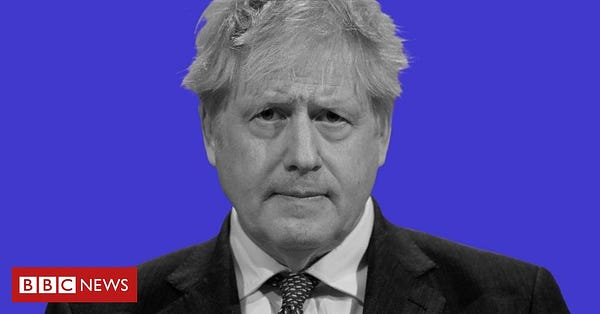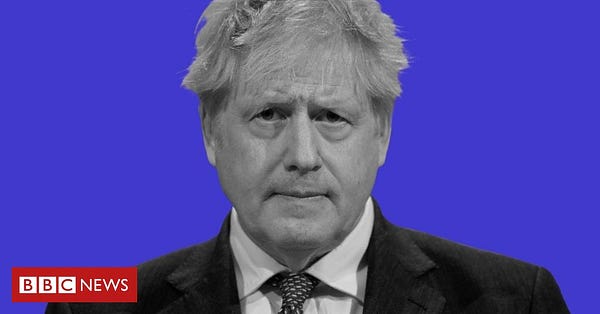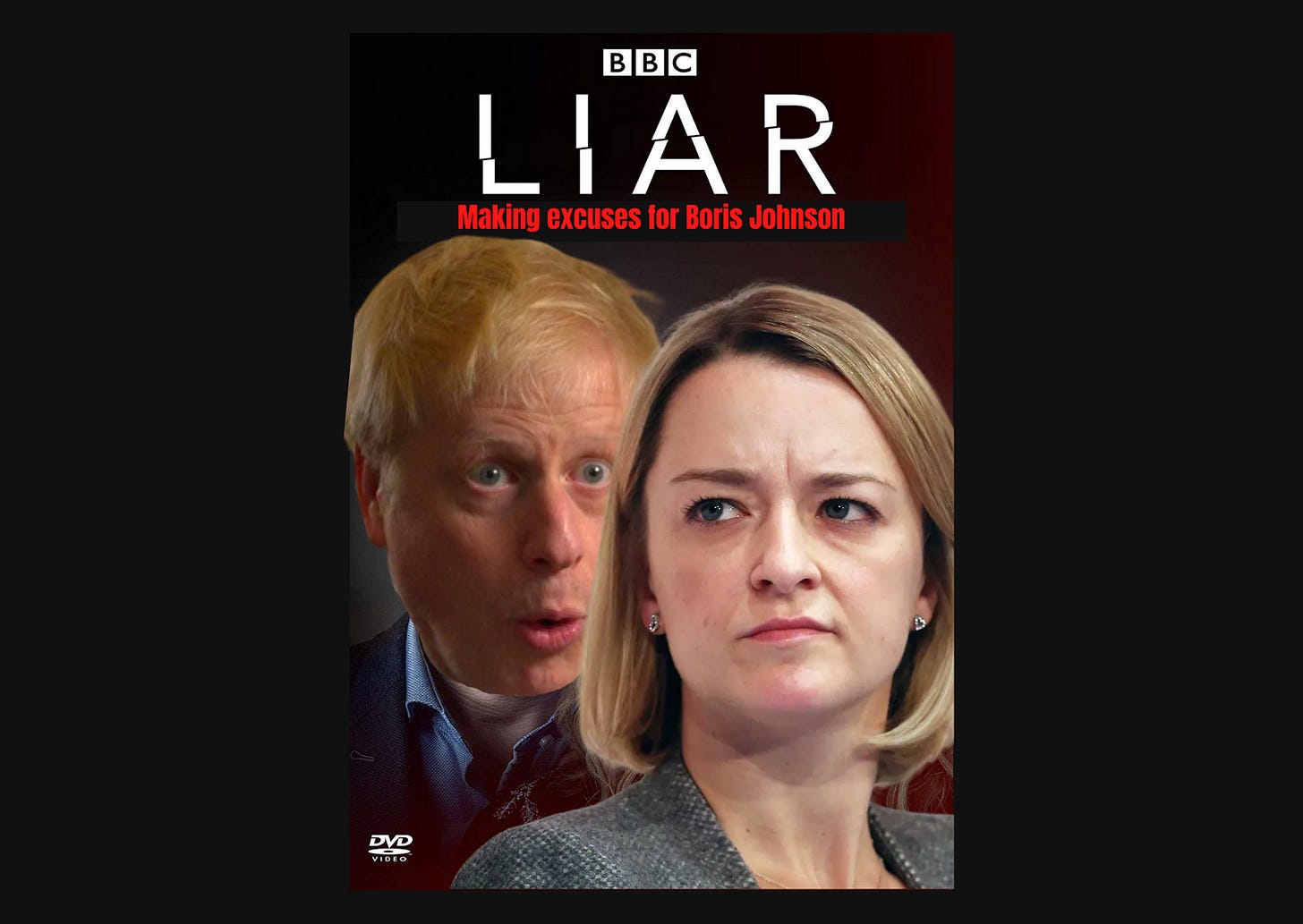Is Boris Johnson a liar? Yes. And much of the British media is lying to us about that fact...
Whether it's Laura Kuenssberg finding complicated excuses for the Prime Minister or The Times saying he's "a messy bitch", the British media works hard to protect a character it helped create...
When a politician tells you something in confidence, always ask yourself 'Why is this lying bastard lying to me?'
That line has frequently been attributed to Jeremy Paxman, but he was just quoting its actual author, Louis Heren. An esteemed foreign correspondent for The Times from the late-40s until the early-70s, Heren offered up the aphorism in his memoirs Growing up on The Times.
Heren’s words sprung to mind as I was reading an article published last night by Laura Kuenssberg on the BBC News website — ‘Boris Johnson: What is the PM's relationship with the truth?’ At the start of the piece, she writes:
Politicians, even really honest ones, regularly say things they don't quite believe.
The public knows this. We don't expect our politicians to be angels. But outright lying, in my experience, is relatively rare. It is too easily found out.
Those two lines illustrate the great gulf between the Heren/Paxman school of journalism and the kind that Kuenssberg and others in the modern Westminster press pack practice.
It’s undeniable that Kuenssberg wants to break stories, but she and others like Nick Robinson, Robert Peston, and Andrew Marr to pick a few examples always seem to be equally concerned about maintaining their place in the ‘in crowd’. Their desire to be in the loop often leads them to parrot lines they have been given free of almost any trace of analysis.


This is a man who was fired from his first professional job for lying and fired from the shadow cabinet for lying about an affair, yet Kuenssberg’s article includes no examples. The record of Boris Johnson’s outright lies is substantial.
In fact, it’s so extensive that Peter Oborne created a whole website to catalogue the deceptions The lies, falsehoods and misrepresentations of Boris Johnson and his government which, although it hasn’t been updated since December 2019, requires a lot of scrolling to get through. Adding all the lies that have dripped from the lips of the Prime Minister and his cabinet since the pandemic hit would be time-consuming.
But Kuenssberg has time and time again stretched to find excuses for the Prime Minister. He cannot simply be a mendacious chancer; there must be ‘more’ there. In her article she writes:
One insider who knows him well says it is simply "unfair and easy to cry 'liar', as the opposition has done".
"He's far more complex and strategic and people don't give him credit for how calculating and clever he is."
God forbid that a political opposition be ‘unfair’. If anything Keir Starmer’s issue is that, as a creature of the establishment himself, he’s often far too fair to the Prime Minister. That his response to the flatgate scandal was to wander around a branch of John Lewis pestering the wallpaper was just embarrassing.


Kuenssberg’s article is full of language that excuses the Prime Minister’s flaws or attempts to ameliorate his behaviour, offering baroque alternatives to simply saying that he lies easily and often. She continues:
Even his worst enemy would acknowledge that he is a skilled wordsmith, and he regularly uses his vast range of sometimes nonsensical vocabulary to deflect, to entertain, or even ridicule. It's certainly not unusual for politicians to try to avoid answering questions that would cast them or their parties in a less than flattering light.
One of the PM's strategies, however, seems to be to bamboozle the listener with a blizzard of verbiage, suggesting agreement, but not committing to anything. Former colleagues suggest that by the time they have decoded what he actually meant, the conversation's over.
An insider told me: "He frequently leaves people with the belief that he has told them one thing, but he has given himself room for manoeuvre," believing that, "the fewer cast iron positions you hold the better because you can always change political direction."
I’m not Boris Johnson’s worst enemy — that’s a toss-up between Dominic Cummings and his own overweening ego — but I certainly don’t accept the shared delusion that he’s “a skilled wordsmith”. I’ve read several of his books and listened to many of his speeches and his style could best be described as a racist Bertie Wooster reading scraps of a Latin primer picked out of a shredder.
When Kuenssberg says the “one of the PM’s strategies… seems to be to bamboozle the listener with a blizzard of verbiage” that’s just another way of saying he lies. He uses words like chaff to disrupt the radar picture of the truth. Telling one person one thing and another something else entirely is lying. Picking and choosing which facts you remember is lying to yourself. Johnson does both constantly and consistently.
The article gets even more ludicrous when Johnson gets to compared to another inveterate liar, fantasist and self-deceiver: Steve Jobs. Kuenssberg writes:
One former colleague compares him to the late Steve Jobs, the hard-driving founder of tech giant Apple. Jobs was said to have a "reality distortion field", described by his biographer as a "confounding melange of a charismatic rhetorical style, indomitable will, and eagerness to bend any fact to fit the purpose at hand".
In other words, ordering the truth to suit his ambitions, refusing to take no for an answer, relishing proving that the impossible could be done.
The ‘reality distortion field’ was just a tech industry way of saying that Steve Jobs could lie to himself and others with ease. The difference between him and Boris Johnson however is that Jobs could bully, cajole, and inspire his teams to actually deliver something. If the iPhone was like Brexit, it wouldn’t have any of the features you were promised, would cost five times as much as you expected, and would break almost immediately after you got it out of the box.

Kuenssberg’s sources — anonymous and minded to protect the Prime Minister in the main — engage in the same kind of dissembling and distortion as the man they are discussing. The piece continues:
Mr Johnson's former colleague told me: "Is there wilful lying? I would struggle to point to a direct example. Does he recreate the truth to suit him? Yes."
This source, and several others, told me the prime minister has a "deep dislike of being accused of lying". Several sources have even suggested that during the 2016 Brexit campaign he was nervous about the now infamous promise, plastered on the side of his battle bus, to spend the £350m a week the UK sends to the EU "to fund the NHS instead".
Mr Johnson was conscious that every time he used this claim, it could be challenged by the fact that the £350m did not take into account the budget rebate the UK got from the EU.
Mr Johnson was all about "images, emotions, he didn't want to be pinned down to a number", says my source.
He was also understood to be unhappy about the campaign's claims about Turkey's proposed entry to the EU, and the potential impact on immigration. If you're reading this, you probably don't need a reminder of how controversial those claims were at the time.
These whispers about his ‘private doubts’ during the Brexit campaign are the same as murmurings that he was actually opposed to lockdowns — an attempt to allow him to have it both ways. And, as Kuenssberg notes in the article, even if the Prime Minister was ‘uncomfortable’ with Vote Leave’s rhetoric — which I don’t believe he was — it didn’t stop him spouting those lines repeatedly in public:
But private doubts about whether the claims were convincing did not stop Mr Johnson become the biggest cheerleader for leaving the EU. The rest, of course, is history.
Even ignoring the unpalatable combination of studied naivety, cosy insiderdom, and calculated ignorance, Kuenssberg’s reporting frequently has the tone of a reception class teacher introducing the children to new words:
Boris Johnson's reputation and popularity is certainly not based on a view that he tells the truth, the whole truth, and nothing but. He has what pollsters call "authenticity" - what you see is what you get. He's not super smooth and he doesn't pretend to be perfect.
The current allegations about his conduct, which he characteristically describes as "farrago of nonsense" do not seem to be shifting public opinion much, if at all.
Today’s letter is A and today’s word is “authenticity”. Do we all know what that means, children? “Genuine?” No, no, it’s not that. You can be as genuine as a Rolex purchased from a man with a trenchcoat full of other slightly shop-soiled timepieces and still be “authentic” in politics. When pollsters say “authenticity” they mean someone who can make their bullshit appealing.


Kuenssberg ends the article with another ‘humanising’ view on Johnson. She concludes:
… popularity matters in politics too. Despite the horrors of coronavirus, hard realities have never been part of the PM's desired script. To use one of his tactics, quoting the classics, the Greek philosopher Plato said: "No one is more hated than he who speaks the truth."
But as one of the few people who genuinely knows Boris Johnson once told me, he is a politician who above all, wants to be loved.
Yes, and he’ll lie about anything to anyone at any time to ensure that he is. It should be journalism’s job to highlight that and explain why it matters, not shrug and say, “Well, that’s just how the games played.”
But Laura Kuenssberg is far from alone in making excuses for Boris Johnson and effectively touching up his clown makeup for him, while the calculating character behind the slap continues to benefit from being given all that doubt.
In The Times yesterday, Janice Turner offered up a column under the headline Why Johnson will always get away with it which went further than even the usual pablum about the Prime Minister’s lies and indiscretions being ‘priced in’. She wrote:
As always when polls defy London liberal logic, the electorate must be wrong. In Doncaster, my home town, a Radio 4 Today reporter found people unfamiliar with “levelling up” or even Sir Keir Starmer. Imagine! That Labour’s red wall is still crumbling, with Hartlepool likely to fall, is clearly because voters are dumb. Why else would they warm to Boris Johnson, the most terrible human being alive?
The truth is Johnson’s supporters haven’t just “priced in” his manifest character flaws, they actually find them reassuring. With his six (or so) children, two divorces, a late-life toddler, demanding new girlfriend, weight problem and propensity for gaffes, his life is a blur of chaos and drama. In popular parlance, he is a “messy bitch” but so are many of us.
It’s always a treat when someone paid a large amount of cash by a national newspaper leans on the fact that in the dim and distant past they grew up somewhere else. It’s also hugely entertaining when they sneer at “London liberal logic” when they are part of the commentariat class for whom “London logic” is the only game in town.

But what’s most aggravating about Turner’s take is that whether or not the rest of us are “messy bitches”, we are not Prime Minister. There are jobs where the personal probity of the person that holds them are more important than others.
If we are comfortable with the Prime Minister being a “messy bitch” — defined here as having financial arrangements that seem opaque, a closeness to various donors of varying levels of dodginess (from not at all to really quite dodgy) — then we are comfortable with standards in public life not merely being in the toilet but heading round the u-bend and into the heart of a suppurating fatberg.
Turner just tosses any notion that the Prime Minister should be held to higher standards than other people out of the window. Much better that our leaders be totes relatable than they actually get anywhere near to abiding by the Nolan principles for behaviour in public life:
Nobody believes the PM, with his filthy car and ill-fitting suits, cares if his wallpaper is wood chip or bespoke. On one level his fiancée running up a gargantuan decor bill is “Carrie Antoinette” (a brilliant coinage which steers blame from Boris and will stick).
On another, she’s your sister-in-law, Lorraine who went bonkers doing her kitchen extension, so your brother had to take out a loan. Of course, dodgy donors and transparent governance matters, but however many inquiries are set up, as long as Johnson didn’t wang it on expenses like a duck house, people will shrug. Some millionaire sorted it out? Don’t they always? How did Lord Mandelson, late of Hartlepool, afford his Regency Notting Hill villa?
My sister-in-law Lorraine — were she to exist — would neither have the power to award huge contracts using public money nor an allowance of £30,000 a year to cover things like that kitchen extension. Turner says, “Of course, dodgy donors and transparent governance matters…” but the “but” she follows that line with illustrates that actually, she doesn’t think it matters at all.
“Some millionaire sorted it out? Don’t they always?” is exactly the perspective you would expect to someone on a well-paid retainer from Rupert Murdoch. For decades he’s been the ‘some billionaire’ who sorted it out. In fact, Turner deserves some credit for her accidental honesty here. Most columnists are, to use adapt a quote from the aforementioned Mandelson, intensely relaxed about the filthy rich doing whatever they want.
Saying “the public doesn’t care about these scandals” as Turner and many other editors, journalists and columnists are is a self-fulfilling prophecy. The media has often made stories it thinks matter to cut through but in this case, it’s not really minded to do that.
The Mail titles are consistently kicking Johnson’s shins and they’d be delighted to have an even harder-line Tory in 10 Downing Street, but they’re just as committed to keeping Labour down. The rest of the right-wing press is engaged in a collective shrug as like Turner they see corruption as just part of the way Britain works.
In The Sunday Telegraph, Janet Daly deploys an argument that has popped up frequently in the newspapers over the past few weeks — the “‘real’ people don’t care about all this” deflection. She writes:
Everybody I have run into in the last week - neighbours in the street, shopkeepers, staff at the hairdressers - has offered a spontaneous anecdote about their wonderful encounter with the Covid vaccination programme. Based either on their own direct experience or that of someone they accompanied to the local vaccine centre, they have expounded on the pleasantness and efficiency of this massive national exercise.
I really cannot recall anything like this unanimous outpouring of personal gratitude for a government policy before.
Some of the more extended conversations included concerns about the broader future: for the economy, or employment or children’s education but, perhaps remarkably, even these potential problems were not blamed on the government but regarded simply as consequences of an unprecedented global crisis with which all countries have had to cope. And not a single one of these conversations with real people contained a reference to Downing Street wallpaper.
… Lesson: if you want to derail a government, don’t do it on technical grounds which few ordinary voters care about. And don’t attack prime ministers at the moment when they are busy saving lives.
Anecdotes aren’t data and could it be that Janet simply doesn’t hang out with anyone who’d say a word against her beloved former colleague Boris? And how does superhero Johnson the Lifesaver square up to the continuing claims about that “let the bodies pile high in their thousands” comment?


Meanwhile in The Mail on Sunday, desperate Dan Hodges, the UK’s most consistently contempt-worthy columnist, continues his series of fairy stories about chatty rats and red moles. After relaying various bits of anonymous gossip, chosen to support his latest theories, Hodges concludes with this dreary bit of doggerel:
At the moment Boris is fighting too many battles. And he’s fighting them on his own.
The people of Britain are sticking with him. But their Prime Minister needs help.
The TV sparks into life with a charity appeal: “For just £850 a roll, you can keep this poor Prime Minister in wallpaper… bouncy Boris needs your help!”
When The Sun hoots that people in “the Red Wall” don’t care about the Prime Minister’s alleged indiscretions and dodgy financial doings, the underlying message is: They don’t care because we’ve worked hard to make sure they don’t
Boris Johnson is a liar and the media that continues to deny that matters and, in fact, finds ways to excuse and distract from the substance of allegations against him is full of liars too. And as the once and future golden goose of the Telegraph’s comment pages, the Prime Minister is one of their own.



